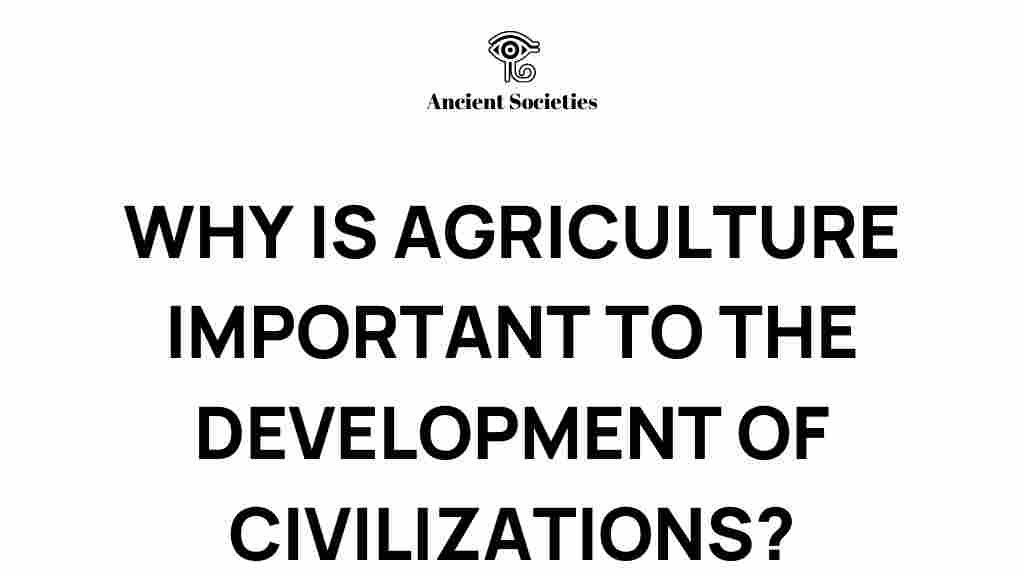The Crucial Role of Agriculture in Shaping Civilizations
Agriculture is often referred to as the backbone of civilization, playing a pivotal role in the development of society throughout history. From the early days of human existence, the transition from nomadic lifestyles to settled farming communities has dramatically influenced the trajectory of human civilization. This article explores the profound impact of agriculture on civilizations, examining its role in economic development, sustainability, food security, and innovation.
The Historical Significance of Agriculture
The history of agriculture is as old as civilization itself. Early agricultural practices allowed humans to cultivate crops and domesticate animals, which led to stable food sources. This stability encouraged population growth and the formation of complex societies. Key milestones in agricultural history include:
- The Neolithic Revolution: This period marked the transition from hunting and gathering to farming, which began around 10,000 BC. It laid the foundation for settled societies.
- The Rise of Civilizations: Agricultural surplus enabled the development of cities, trade, and social hierarchies. Civilizations such as Mesopotamia, Egypt, and the Indus Valley thrived due to their agricultural practices.
- Technological Innovations: The introduction of tools and techniques, such as the plow and irrigation systems, revolutionized farming and increased productivity.
Agriculture and Economic Development
The relationship between agriculture and economy is intrinsic. Agriculture not only provides food but also serves as a major economic driver for many countries. Here’s how agriculture fuels economic development:
- Employment Opportunities: Agriculture is a significant source of employment, particularly in developing countries. Millions of people depend on farming for their livelihoods.
- Trade and Exports: Agricultural products are crucial for trade. Countries rich in agricultural resources can export products, improving their economic standing.
- Rural Development: Investments in agriculture lead to the development of rural areas, enhancing infrastructure and overall quality of life.
Impact on Society
Agriculture shapes society in multifaceted ways. It influences cultural practices, social structures, and community dynamics. Here are some key impacts:
- Cultural Identity: Many societies develop strong cultural identities tied to their agricultural practices, including festivals, rituals, and cuisines.
- Social Hierarchies: Agricultural surplus often leads to wealth accumulation, resulting in social stratification and the emergence of different classes.
- Community Cooperation: Farming often fosters a sense of community as people collaborate during planting and harvest seasons.
Agriculture and Sustainability
In the current context of climate change and environmental degradation, sustainable agricultural practices are vital. Here’s how agriculture can contribute to sustainability:
- Soil Health: Sustainable practices, such as crop rotation and organic farming, maintain soil fertility and prevent erosion.
- Water Conservation: Techniques like drip irrigation help conserve water, essential for long-term agricultural viability.
- Biodiversity: Sustainable agriculture promotes biodiversity, which is crucial for ecosystem health.
Food Security and Agriculture
Food security is an essential aspect of human development, and agriculture plays a critical role in ensuring that all people have access to sufficient, safe, and nutritious food. The connection between agriculture and food security can be summarized as follows:
- Increased Production: Advancements in agricultural technology lead to higher yields, contributing to food availability.
- Diverse Crops: Growing a variety of crops can enhance food security by reducing dependence on single food sources.
- Local Food Systems: Strengthening local food systems can improve access to fresh produce and reduce food deserts.
Innovation in Agriculture
Innovation is at the heart of modern agriculture, driving efficiency and sustainability. Key areas of innovation include:
- Genetic Engineering: Advances in biotechnology allow for the development of crops that are resistant to pests, diseases, and climate conditions.
- Precision Agriculture: Technology such as GPS and IoT devices enable farmers to monitor crops and optimize resource use, improving productivity.
- Agroecology: This approach combines traditional farming practices with modern science to create sustainable agricultural systems.
Challenges Facing Agriculture
Despite its importance, agriculture faces numerous challenges that can hinder its role in civilization. Some of the key challenges include:
- Climate Change: Changing weather patterns threaten crop yields and food production.
- Resource Depletion: Overuse of water and soil resources can lead to degradation and diminished productivity.
- Market Volatility: Fluctuating prices can threaten farmers’ livelihoods and food accessibility for consumers.
Strategies for Sustainable Development
To ensure that agriculture continues to play a positive role in shaping civilizations, several strategies can be implemented:
- Invest in Research: Supporting agricultural research can lead to innovative solutions for sustainable practices.
- Promote Education: Educating farmers about sustainable methods and technologies can enhance productivity and environmental stewardship.
- Support Local Initiatives: Encouraging local food systems and farmer cooperatives can strengthen community resilience.
Conclusion
Agriculture is undeniably a crucial component in shaping civilizations throughout history. Its influence on the economy, society, sustainability, food security, and innovation is profound. As we face modern challenges such as climate change and food insecurity, it is essential to prioritize sustainable agricultural practices and innovations. By doing so, we not only ensure our survival but also pave the way for future generations to thrive.
For more information on sustainable agricultural practices and their impact on societies, visit this resource.
As agriculture continues to evolve, the potential for innovation and development remains vast. Embracing sustainable practices today will lead to a more secure and prosperous future for all.
This article is in the category History and created by AncientSocieties Team

2 thoughts on “The Crucial Role of Agriculture in Shaping Civilizations”